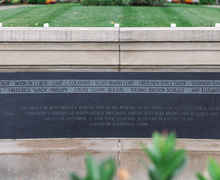SU’s Africa Initiative hosts ‘Book Talk’ with authors Amber Murrey, Patricia Daley
Delia Rangel | Contributing Writer
Africa Initiative hosts a Book Talk with authors of “Learning Disobedience: Decolonizing Development Studies.” Amber Murrey and Patricia Daley spoke about breaking down the Eurocentric curriculum.
Support The Daily Orange this holiday season! The money raised between now and the end of the year will go directly toward aiding our students. Donate today.
After Syracuse University’s Africa Initiative chose to read and discuss “Learning Disobedience: Decolonizing Development Studies” as a group, they hosted a Book Talk conversation with the authors Amber Murrey and Patricia Daley Tuesday.
“I’m so happy that you guys are here to give us a comprehensive analysis, what the book is really about and how we should think about it,” said Africa Initiative board member and political science Ph.D. Mahder Habtemariam Serekberhan.
Published in August 2023, the book explores the idea that, “being intentionally disobedient in the classroom is central to decolonizing development studies,” according to the synopsis. The two-hour conversation, led by Serekberhan, consisted of tellings of the authors’ personal works and efforts to put the framework they lay out in their book into practice.
SU’s Africa Initiative is housed under the Department of African American Studies. The initiative’s goal is to increase interest in Africa through a variety of events promoting a diverse and international education. At the event, Serekberhan had lots of praise for the authors and described her favorite aspects.
“I think this is a great book, it’s a great interdisciplinary resource with not only literature but videos, social media content, comedic relief, music and so much more, which in and of itself, disrupts the Eurocentric confinement of knowledge production to academia,” Serekberhan said.
Both authors are geography professors at the University of Oxford and detailed their efforts in changing their geography curriculum. Murrey is an Associate Professor of Political Geography and Daley is a Professor of the Human Geography of Africa.
In Daley’s portion of the chat, she took time to focus on her work in “decolonizing” geography education at Oxford. Her own curriculum is at the forefront of her work and differs from other universities. Daley said that as Oxford University is a globally renowned institution, it has a duty to increase diversity in education and should be at the forefront of anti-racism.
Daley spoke about geography as a whole and the stereotypes within the field. She mentioned the Google images that appear in a search for “geographer” and showed a slide with the results, which were overwhelmingly images of white men.
Murrey added that even those who do not attend a post-secondary institution themselves are still influenced by its teachings.
“Even those who do not attend formalized post-secondary education are influenced by those school teachers, the journalists, the pundits, the authors, the politicians, the researchers were trained within the walls of Oxford so that the thought filters down into society,” Murrey said.
Daley also took participants through an outline of each chapter of the book and described the “why” behind each chapter. Each chapter highlights a different topic, including chapters on the male gaze and capitalism.
“Each chapter offers classroom practices, materials and questions for reflection, that seek to cultivate disobedience with dominant logic and models of development in the colonial university,” Daley said.
Murrey took the time to talk about her own work that inspired some of the book’s contents. She spoke about a “random sampling” project she did while designing an Introduction to Development Studies course for master’s students before her time at Oxford. She took a sample of 28 “International Development” syllabi from universities all over the world and noticed a trend in the language being used.
“Decolonial options, assassination, race or anti-racism did not appear at all in any of the syllabi that I had access to,” Murrey said. “We’re talking about this tonight, in order to establish the paradigm against which Patricia (Daley) and I are seeking to navigate in the creation of this particular pedagogical approach.”
Murrey and Daley ended the conversation by answering eager questions from students about the chapters they found most powerful. Serekberhan asked about a particular chapter and the question it poses about what it means to unlearn colonial and capitalist views.
The authors were excited to see such interest in their work. In their closing remarks, Daley reiterated the book’s message.
“Disobedience in the colonial university requires both anti-colonial fatigue and decolonial imaginations,” Daley said. “We envision our book to be an entry point to be an entry point, in a much longer journey.”
Published on November 28, 2023 at 10:27 pm
Contact Delia: dsrangel@syr.edu






